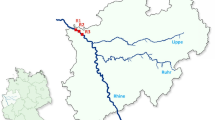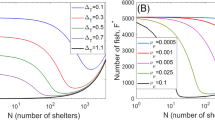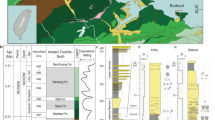Abstract
THE life-history of the monogenetic Trematode, Polystoma integerrimum, has been studied experimentally by Zeller1,2 and by Gallien3. Both made some field observations, but no full investigations of natural epizootics appear to have been made. A quantitative study of about a thousand tadpoles, with about four thousand parasites, in seven epizootics has now been made, in which the course of the epizootics has been followed through the various stages. The experimental observations have been broadly confirmed, but the events in Nature do show certain differences, and some new facts have been found.
This is a preview of subscription content, access via your institution
Access options
Subscribe to this journal
Receive 51 print issues and online access
$199.00 per year
only $3.90 per issue
Buy this article
- Purchase on SpringerLink
- Instant access to full article PDF
Prices may be subject to local taxes which are calculated during checkout
Similar content being viewed by others
References
Zeller, E., Z. wiss. Zool., 22, 1 (1872).
Zeller, E., Z. wiss. Zool., 27, 238 (1876).
Gallien, L., Trav. Stat. Zool. Wimeraux, 12 (1935).
Author information
Authors and Affiliations
Rights and permissions
About this article
Cite this article
SAVAGE, R. Natural Epizootics of Polystoma integerrimum in Tadpoles. Nature 164, 618 (1949). https://doi.org/10.1038/164618a0
Issue date:
DOI: https://doi.org/10.1038/164618a0



